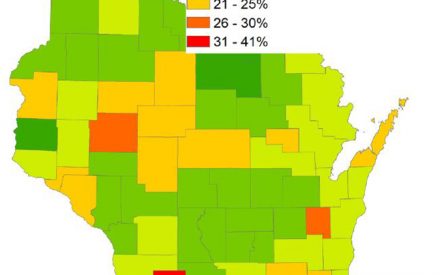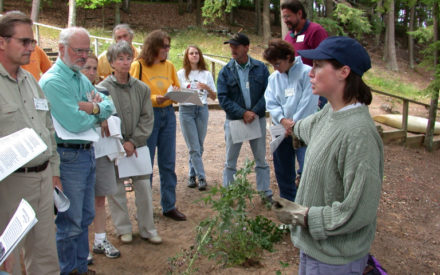Private wells are the primary water source for approximately one-third of Wisconsin residents. Approximately 9% of private wells are above accepted health guidelines for nitrate-nitrogen in drinking water. Between 15-25% of private wells contain coliform bacteria—an indicator of potential pathways for harmful pathogens that enter a well water system. Private wells do not benefit from the daily oversight of municipal water systems, therefore well owners must act as their own water utility managers, and must make informed decisions about their household drinking water.
In response, Extension’s Water WELLness program provides private well owners with access to water testing kits, that are subsequently analyzed in a certified lab. We also share science-backed information that is designed to help them keep drinking water safe for their families. Extension mainly targets rural landowners, who are most likely to rely on private wells as their primary source of drinking water. Our well testing packages include the most commonly recommended well tests and are arranged in a way that makes it easy for people to understand which tests to perform. In 2020, 4,522 households submitted water samples from their individual private wells. In addition, Extension has had 491 educational contacts with individuals, where we provided one-on-one consulting and educational sessions related to well testing and results.
The water quality information that we generate in collaboration with Wisconsin residents is integrated into the “Wisconsin Well Water Viewer”, a data-driven online tool that helps paint the picture of groundwater quality in the state. The general public, conservation professionals, and local officials access this information to learn about well water quality in their area. This helps them decide on where to target conservation efforts, or where to focus additional educational strategies related to groundwater quality and/or safe drinking water. For example, the Wisconsin Department of Natural Resources utilized Extension’s well-water testing data when updating Wisconsin’s Administrative Rules related to water runoff (NR151 – Nitrate Targeted Performance Standard) in 2020.
Because these efforts are locally driven, Extension works closely with county Land and Water Conservation Departments, Health Departments, Zoning and other local entities. For example, following their involvement in Extension’s well testing program, officials in five counties (Chippewa, Green, Sauk, St. Croix and Dodge) initiated formal well water trend monitoring studies to address community concerns regarding water quality.
Water WELLness is part of Extension’s Natural Resources Institute. Learn more by visiting go.wisc.edu/waterwellness.
Download Article

 Well Contamination in Southwest Wisconsin
Well Contamination in Southwest Wisconsin Woodland Wildlife Management Program for Private Landowners
Woodland Wildlife Management Program for Private Landowners Mitigating Manure’s Effect on Water Quality
Mitigating Manure’s Effect on Water Quality Youth in Governance
Youth in Governance


